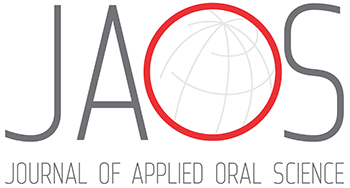Some studies have shown a relationship between temporomandibular disorders (TMD) and dysphonia, as well as quality of life in oral health. OBJECTIVE: The purpose of this study was to investigate the correlation between severity of vocal self-perception and TMD severity and the correlation between oral health-related quality of life impairment and TMD severity. MATERIAL AND METHODS: Thirty-three women aged 20 to 40 years, with or without complaint of dysphonia, were recruited at the Bauru campus of the University of São Paulo, Brazil, and the local community. All participants were subjected to an investigation of quality of life related to dental and speech aspects by the application of Oral Health Impact Profile-short form (OHIP-14) and the Voice-Related Quality of Life (V-RQOL) protocol. Also, a questionnaire was applied to detect the presence and severity of TMD. RESULTS: There was significant correlation between TMD and quality of life for all aspects analyzed in the oral health protocol, except for function and physical limitation (p>0.05). There was negative correlation between TMD and voice-related quality of life in the total score (p=0.007) as weel as physical (p=0.008) and socio-emotional aspects (p=0.017). In addition, there was statistically significant correlation between TMD and vocal self-perception (p=0.037). CONCLUSION: There is an association between TMD severity, voice-related and oral health-related quality of life. It is important to investigate in future studies the vocal self perception as well as the oral and voice conditions in patients with TMD.
Temporomandibular joint disorders; Voice; Quality of life




